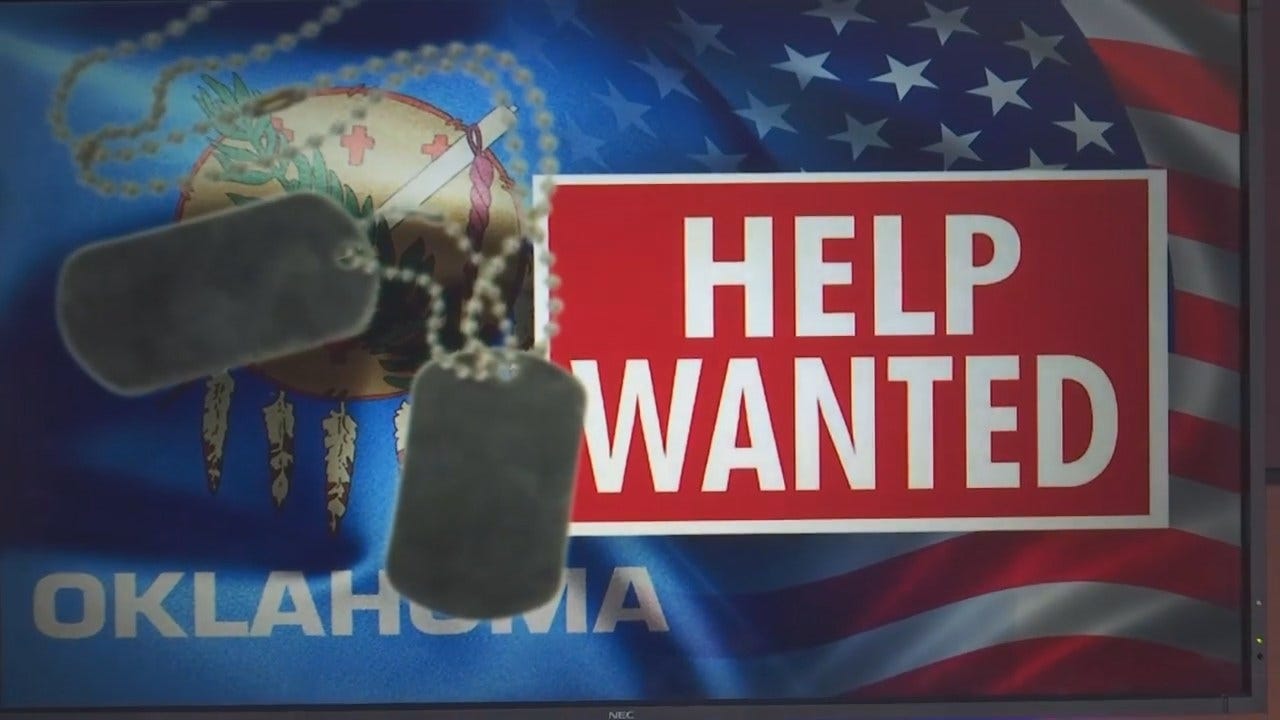Help For Unemployed Oklahoma Veterans
<p>One group of Oklahomans that has struggled with employment more than would seem appropriate, considering their sacrifices, is our veterans. </p>Wednesday, July 19th 2017, 6:05 pm
One group of Oklahomans that has struggled with employment more than would seem appropriate, considering their sacrifices, is our veterans.
Officially, veterans in Oklahoma are unemployed at about the same rate as the rest of the population, but tens of thousands of them aren't even trying to find jobs -- they've given up.
That's the bad news. The good news is the situation seems to be improving.
Among the hundreds who showed up at a recent job fair in Oklahoma City were Christopher Bishop and Thomas Cyrus, two veterans whose military careers were cut short.
"Blew me up and buckled my knee, tore my knee, everything in my knee," said Cyrus, the victim of an improvised explosive device (IED) in Iraq in 2010.
Bishop was also injured in Iraq and, like Cyrus, eventually was medically discharged. Both men say the transition to civilian life has been frustrating.
"It is, it has been rough," Bishop commented, "because I can lead a nine-man squad into combat, but then I come out to the civilian world and I can barely push a piece of paper across a desk."
A mechanic in the army, Cyrus had some initial success finding work fixing trucks. But his injury got in the way.
"And then I had to get out for medical reasons, had to leave that job," Cyrus lamented.
Bishop tried his hand at construction when he came back home, but it didn't last.
"I did a little self-employed home repair, stuff like that," said Bishop, "but my injuries--just, I couldn't sustain it."
They are certainly not alone.
According to the Bureau of Labor Statistics, just over 7,000 -- 4.5 percent of the 164,000 veterans in Oklahoma's work force -- are unemployed. But there's another 152,000 veterans who aren't considered in the work force, which means they're either not looking for jobs, or have given up looking.
"I would like to see us do better," said State Senator Frank Simpson, "because I think military people bring some unique skills with them that maybe their civilian counterparts don't have."
Sen. Simpson, R-Springer, a veteran himself, is trying to help. In 2015, Simpson sponsored legislation allowing private companies to do what state agencies were already doing -- give hiring preference to veterans.
"Walmart worked very closely with me on that legislation," Simpson recalled, "because they had had success with it in other states."
And they're having success with it now in Oklahoma, as well.
Jeff Kowalik can attest to that. After 18 years in the army -- much of that time as a drill sergeant -- Kowalik was medically retired recently.
"I put my application in everywhere -- anywhere, everywhere," Kowalik admitted.
He says his job search was going nowhere until social media connected him with one of his former privates--
"Jarred Crabtree, yes," said Kowalik.
Crabtree was also out of the army and had successfully transitioned to civilian life. A market manager for Walmart, Crabtree manages eight Super Centers in Oklahoma City and he told Kowalik he wanted to make him part of his management team.
Kowalik was living in Texas at the time, but immediately drove north for an interview and accepted the offer.
"At one time, I was his boss," laughed Kowalik, "and now the tides have turned.
But Kowalik says he couldn't be happier about it, and Crabtree says he was thrilled to be able to add another veteran to his team, one of more than 5,000 veterans Walmart has hired in Oklahoma since announcing its Welcome Home commitment in 2013.
"I mean, from the technical specialties to managing diverse groups of people, and teamwork," said Crabtree, "they just bring so much to the table."
No one would agree more with that sentiment than retired Colonel Warren Griffis. For years, Griffis worked as the employment coordinator for the Oklahoma National Guard, but earlier this year he moved over to the Oklahoma Department of Veteran Affairs, where he is filling a new position aimed at getting more veterans into good jobs.
"The goal is just to try to help as many veterans as possible," explained Griffis, in a recent interview.
In many cases, Griffis and others agree, it's a matter of teaching and encouraging veterans to speak and act more like their non-military counterparts.
"They have to learn to translate military terms into civilian terms on resumes," noted Griffis, "interviewing, coaching, and just networking, and also connecting with programs and resources that exist in our state."
Bishop and Cyrus found one of those resources -- Oklahoma County's veterans diversion program, for veterans who've had minor run-ins with the law.
"Helping us get back on our feet, and show that we're not bad people," Cyrus said, "we just made some bad mistakes, bad decisions."
Both veterans got some good leads at the job fair, and say anyone who hires them will get dedicated workers with leadership skills only the military can teach.
"We're gonna give you, not 100, but 110 percent every time," Bishop stated.
Col. Griffis says veterans provide leadership, skills, and reliability on the job, and wants to employers to take advantage of their experience, and use the hiring preference law to bring them on board in greater numbers.
Griffis says any veteran who needs help should contact him, either by phone, (405) 523-4036, or via email, wgriffis@odva.state.ok.us


Alex Cameron
Alex Cameron is Griffin Media’s Washington Bureau Chief, reporting from our nation’s capital on issues that impact Oklahomans. An award-winning journalist, Alex first joined the News 9 team in 1995, and his reporting has taken him around the world, covering stories in Bosnia, Colorado, Washington, D.C., Seattle, New York and Ukraine.
More Like This
July 19th, 2017
August 29th, 2025
July 12th, 2025
Top Headlines
September 22nd, 2025
September 22nd, 2025
September 22nd, 2025











